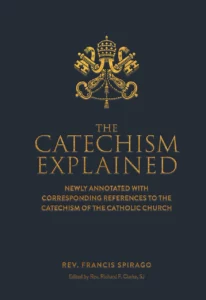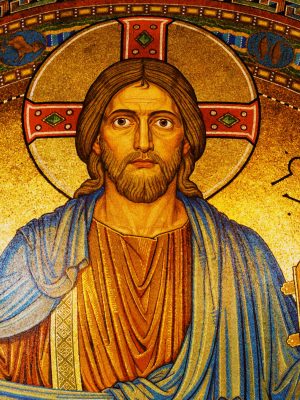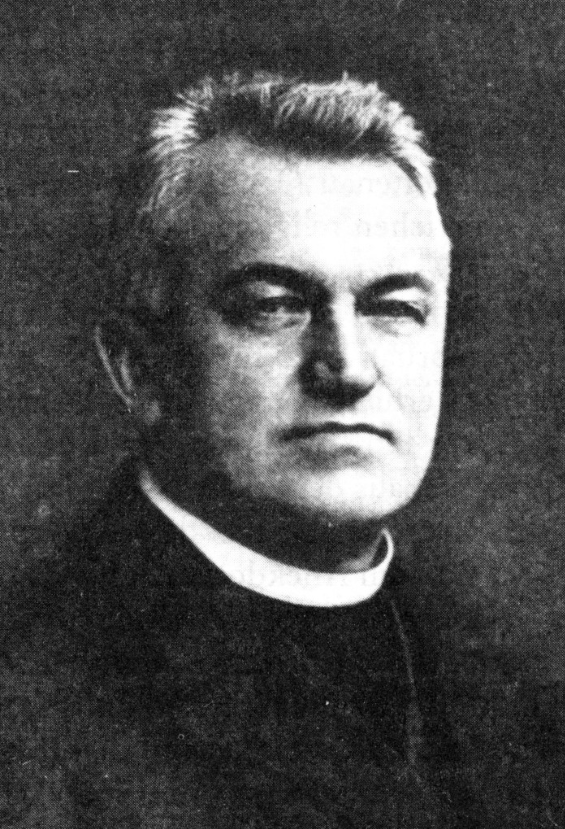The Incarnation of the Son of God is a mystery which we cannot understand, but only admire and honor.
The conception and Incarnation are as little understood by us as the flowering of the rod of Aaron (Numb. 17). “Shut thy eyes, O Reason,” says St. Bernard, “for under the veil of faith thou canst see the sheen of this mystery, just as the eye of the body can bear the light of the sun when shaded by a cloud.” “I know that the Son of God became man, but how I do not know” (St. John Chrysostom). The following are illustrations which have been used to convey the idea of the union of the Godhead and the human nature in Christ: The divinity and the humanity are united in Christ as body and soul are united in man (Athanasian Creed). If spirit and matter, so essentially distinct, are united in man, all the less matter of surprise is it that the divinity and humanity, which after all have their points of resemblance, are found united in Christ. “Speech is a sort of incarnation,” says St. Augustine. “At first the word is conceived as a mere thought, something purely spiritual. If that thought is to be conveyed to another, it is put in words; yet, though it appeals to the senses, it is none the less produced from the soul. So the Word of God has appeared to many and ceases not to remain with the Father.” Other illustrations to show the action of the Holy Spirit in Christ’s conception: St. Isidore tells us that Christ was formed from Mary just as Eve was formed from Adam. The Incarnation resembles in some respects the creation, when everything was produced by God’s almighty power without co-operation of man.
The mystery of the Incarnation is commemorated by the ringing of the Angelus bell.
The words of the Angelus recall in the most lively way the scene of the Annunciation. At the words in the Credo of the Mass: “He took flesh in the womb of the Blessed Virgin Mary by the Holy Spirit” the celebrant always kneels, also at the words in the Last Gospel: “And the Word was made flesh.” On Christmas Day and the Annunciation (the twenty-fifth of March), the sacred ministers at High Mass kneel on the altar steps and bow their heads at the “Et incarnatus est” of the Credo. The angels also venerate the mystery of the Incarnation.
The Incarnation of the Son of God was necessary to give perfect satisfaction to the injured majesty of God.
God might have chosen some other means for redeeming man. He might, by special exercise of His goodness, have been content with an imperfect satisfaction, or have remitted the guilt without demanding any satisfaction at all. St. Augustine on this subject writes: “There are some foolish people who think that God could not have redeemed mankind otherwise than by Himself taking flesh, and suffering at the hands of sinners. He might have followed quite another plan.” As we shall see in treating of the death of Christ God wished to have perfect satisfaction, to display His justice as well as His mercy. Perfect satisfaction could be given only by a God-man. The greatness of an injury is measured by the dignity of the person who suffers; hence the offence given to God is infinitely great. No finite being, not even the most perfect angel, could atone for an offence against God, only God Himself. “So that,” to use the words of St. Anselm, “to redeem man it was necessary that God should become man.” As God only He could not suffer; as man only He could not redeem; hence the Godhead assumed a human nature (St. Proclus). If a valuable portrait be damaged beyond recognition it cannot be restored unless the sitter present himself to the artist; thus God had to come down on earth to restore His likeness in man (St. Athanasius).
The God-man could satisfy perfectly the injured majesty of God by appearing on earth in a state of lowliness.
Had He appeared in His majesty men would never have dared to crucify Him (1 Cor. 2:8). Like Codrus, the Athenian king, He secured victory to His own by dying for them. The oracle had promised the Athenians victory if their king died by the hands of the enemy, and Codrus, disguising his royal dress, marched into the enemy’s camp and was by them put to death. The prophets had foretold that mankind should be saved by the death of its King, and Christ, taking on the form of a slave, was put to death. The evil spirits fled when they saw Whom they had killed. “If,” as Louis of Granada says, “a king would prove his courage in battle, he must put away all symbols of his rank, to proclaim them only when he is victor;” and this is what Our Lord did. He will come again with great power and majesty (Matt. 26:64). St. Thomas says that we cannot affirm with certainty that God would have become man had man not sinned; it certainly would not have been beyond His power.
This article is taken from a chapter in The Catechism Explained by Rev. Francis Spirago, which is available from TAN Books.









